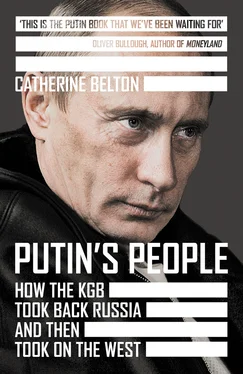The only trace of any operative activity connected to Putin is a letter from him to Böhm, asking for the Dresden Stasi chief’s assistance in restoring the phone connection for an informant in the German police who ‘supports us’. The letter is short on any detail, but the fact of Putin’s direct appeal to Böhm appears to indicate the prominence of his role.[50] Jehmlich indeed later confirmed that Putin became the main KGB liaison officer with the Stasi on behalf of the KGB station chief Vladimir Shirokov. Among the recent finds was one other telltale document: Putin’s Stasi identity card, which would have given him direct access to Stasi buildings and made it easier for him to recruit agents, because he would not have had to mention his affiliation with the KGB.
Many years later, when Putin became president, Markus Wolf and Putin’s former KGB colleagues took care to stress that he had been a nobody when he served in Dresden. Putin was ‘pretty marginal’, Wolf once told a German magazine, and even ‘cleaning ladies’ had received the Bronze Medal awarded to him.[51] The KGB colleague Putin shared an office with on his arrival in Dresden, Vladimir Usoltsev, who was somehow permitted to write a book on those times, took care to emphasise the mundanity of their work, while revealing zero detail about their operations. Though he admitted that he and Putin had worked with ‘illegals’, as the sleeper agents planted undercover were called, he said they’d spent 70 per cent of their time writing ‘senseless reports’.[52] Putin, he claimed, had only managed to recruit two agents during his entire five years in Dresden, and at some point had stopped looking for more, because he realised it was a waste of time. The city was such a provincial backwater that ‘the very fact of our service in Dresden spoke of how we had no future career’, Usoltsev wrote.[53] Putin himself claimed he’d spent so much time drinking beer there that he put on twelve kilos.[54] But the photographs of him in those days do not suggest any such weight gain. Russian state television later proclaimed that Putin was never involved in anything illegal.
But one first-hand account suggests the downplaying of Putin’s activities in Dresden was cover for another mission – one beyond the edge of the law. It suggests that Putin was stationed there precisely because it was a backwater, far from the spying eyes in East Berlin, where the French, the Americans and the West Germans all kept close watch. According to a former member of the far-left Red Army Faction who claimed to have met him in Dresden, Putin had worked in support of members of the group, which sowed terror across West Germany in the seventies and eighties: ‘There was nothing in Dresden, nothing at all, except the radical left. Nobody was watching Dresden, not the Americans, not the West Germans. There was nothing there. Except the one thing: these meetings with those comrades.’[55]
*
In the battle for empire between East and West, the Soviet security services had long been deploying what they called their own ‘active measures’ to disrupt and destabilise their opponent. Locked in the Cold War but realising it was too far behind technologically to win any military war, ever since the sixties the Soviet Union had found its strength lay in disinformation, in planting fake rumours in the media to discredit Western leaders, in assassinating political opponents, and in supporting front organisations that would foment wars in the Third World and undermine and sow discord in the West. Among these measures was support for terrorist organisations. Across the Middle East, the KGB had forged ties with numerous Marxist-leaning terror groups, most notably with the PFLP, the Popular Front for the Liberation of Palestine, a splinter group of the Palestine Liberation Organisation that carried out a string of plane hijackings and bomb attacks in the late sixties and seventies. Top-secret documents retrieved from the archives of the Soviet Politburo illustrate the depth of some of these connections. They show the then KGB chief Yury Andropov signing off three requests for Soviet weapons from PFLP leader Wadi Haddad, and describing him as a ‘trusted agent’ of the KGB.[56]
In East Germany, the KGB actively encouraged the Stasi to assist in its ‘political activities’ in the Third World.[57] In fact, support for international terrorism became one of the most important services the Stasi rendered to the KGB.[58] By 1969 the Stasi had opened a clandestine training camp outside East Berlin for members of Yassar Arafat’s PLO.[59] Markus Wolf’s Stasi foreign-intelligence unit became deeply involved in working with terrorist groups across the Arab world, including with the PFLP’s notorious Carlos Ramirez Sanchez, otherwise known as Carlos the Jackal.[60] Stasi military instructors set up a network of terrorist training camps across the Middle East.[61] And when, in 1986, one Stasi counter-intelligence officer, horrified at the mayhem that was starting to reach German soil, tried to disrupt the bombing plots of a group of Libyans that had become active in West Berlin, he was told to back off by Stasi chief Erich Mielke. ‘America is the arch-enemy,’ Mielke had told him. ‘We should concern ourselves with catching American spies and not bother our Libyan friends.’[62] Weeks later a bomb went off at the La Belle discothèque in West Berlin, popular with American soldiers, killing three US servicemen and one civilian, and injuring hundreds more. It later emerged that the KGB had been aware of the activities of the bombers, and knew exactly how they’d smuggled their weapons into Berlin.[63] Apparently all methods were to be permitted in the fight against the US ‘imperialists’.
One former KGB general who defected to the US, Oleg Kalugin, later called these activities ‘the heart and soul of Soviet intelligence’.[64] The former head of Romania’s foreign-intelligence service, Ion Mihai Pacepa, who became the highest-ranking eastern-bloc intelligence officer to defect to the US, had been the first to speak openly about the KGB’s operations with terrorist groups. Pacepa wrote of how the former head of the KGB’s foreign intelligence, General Alexander Sakharovsky, had frequently told him: ‘In today’s world, when nuclear arms have made military force obsolete, terrorism should become our main weapon.’[65] Pacepa also stated that KGB chief Yury Andropov had launched an operation to stoke anti-Israeli and anti-US sentiment in the Arab world. At the same time, he said, domestic terrorism was to be unleashed in the West.[66]
West Germany had been on edge ever since the far-left militant Red Army Faction – also known as the Baader-Meinhof Group after its early leaders Andreas Baader and Ulrike Meinhof – launched a string of bombings, assassinations, kidnappings and bank robberies in the late 1960s. In the name of toppling the country’s ‘imperialism and monopoly capitalism’, they’d killed prominent West German industrialists and bankers, including the head of Dresdner Bank in 1977, and had bombed US military bases, killing and injuring dozens of servicemen. But by the end of the seventies, when the West German police stepped up a campaign of arrests, the Stasi began providing safe haven in the East to members of the group.[67] ‘They harboured not just one but ten of them. They lived in cookie-cutter buildings around Dresden, Leipzig and East Berlin,’ said the German security consultant Franz Sedelmayer.[68] The Stasi had provided them with false identities, and also ran training camps.[69] For four years, from 1983 to 1987, one of their number, Inge Viett, had lived under a false name in a Dresden suburb, until one of her neighbours travelled to West Berlin and saw her face on a wanted poster there. She was one of West Germany’s most wanted terrorists, known as the ‘grandma of terrorism’, accused of participating in the attempted assassinations of a NATO commander-in-chief and the commander-in-chief of US forces in Europe, General Frederick Kroesen.[70]
Читать дальше












